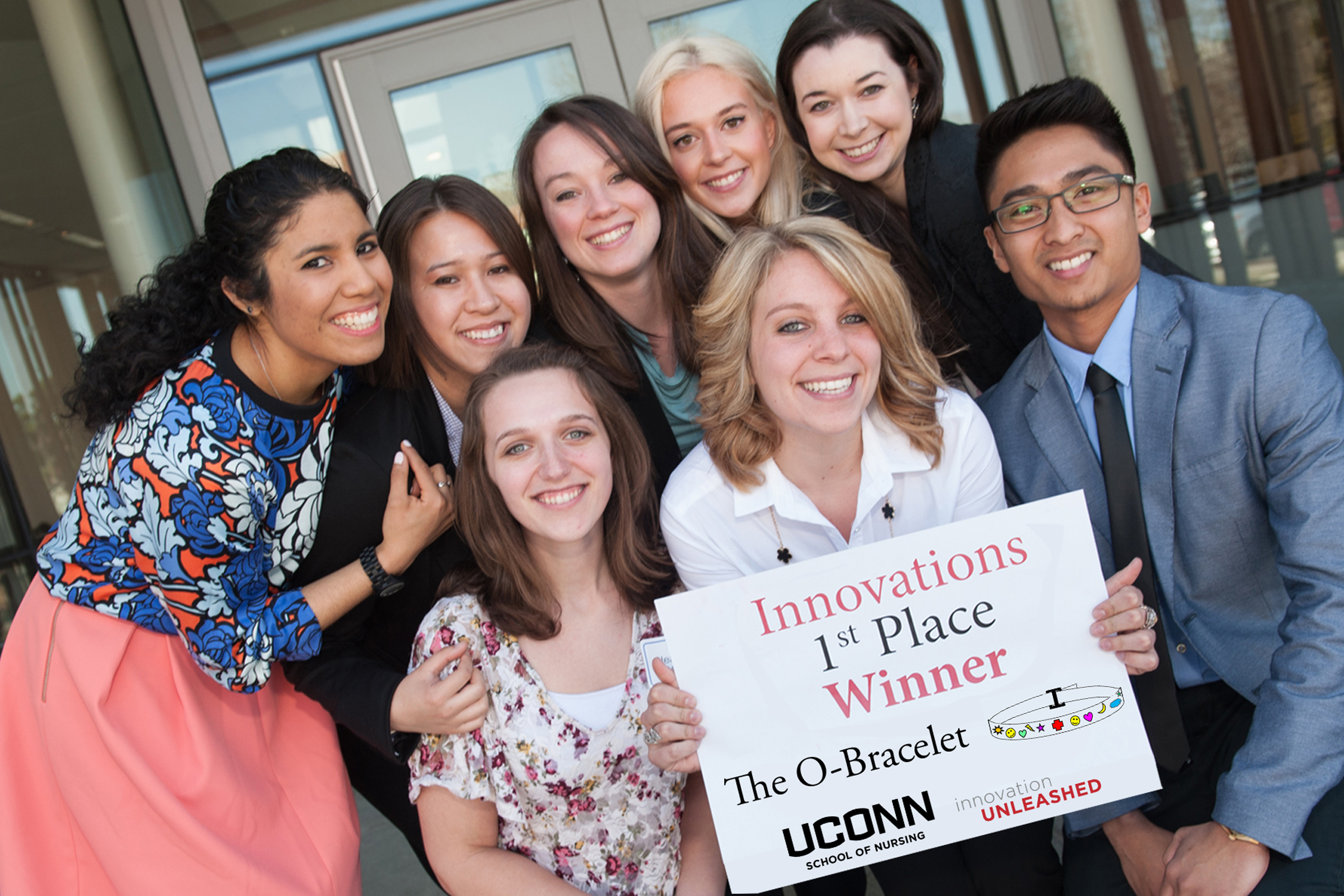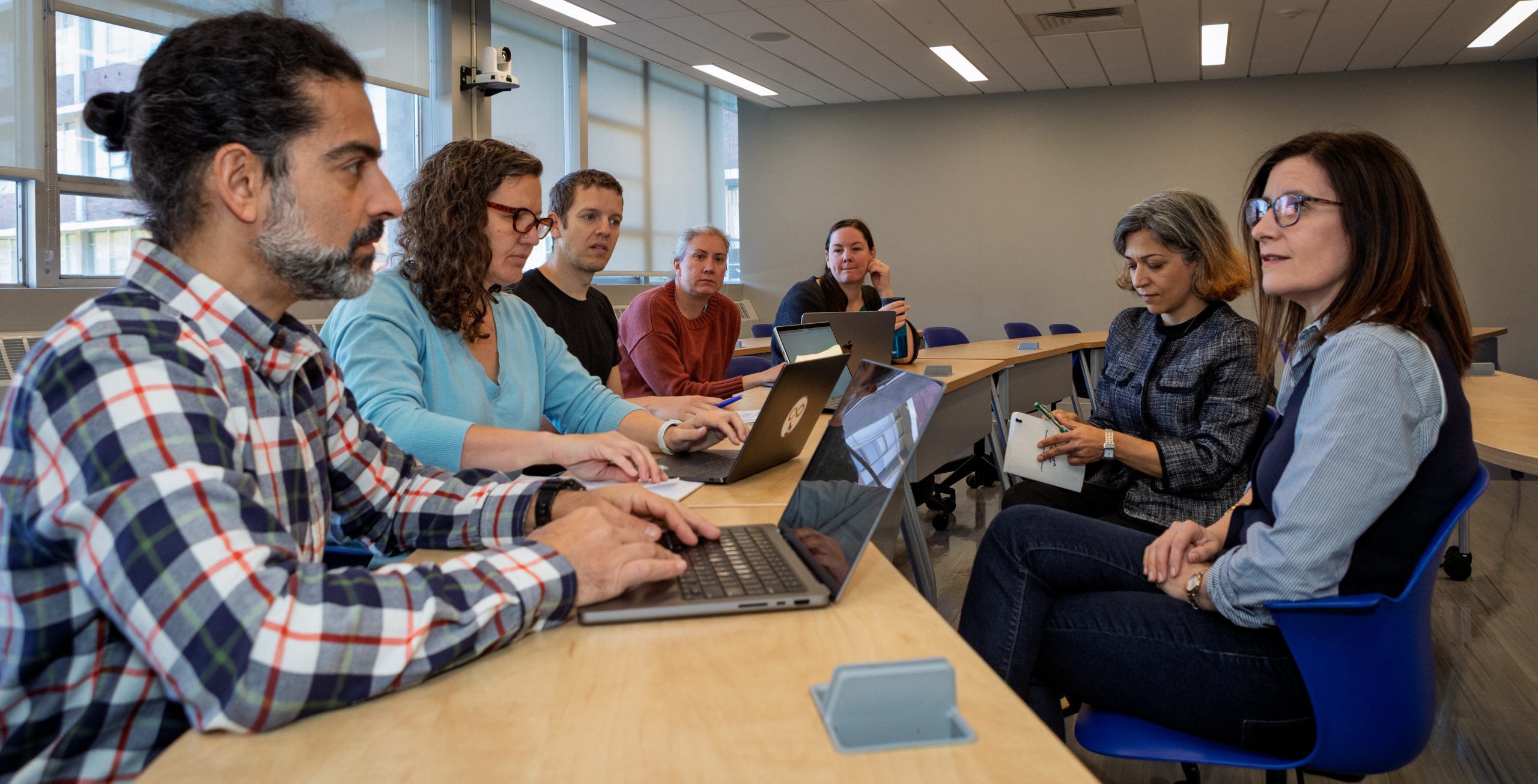Nursing has always been a hands-on health profession. Over the past century and a half, the reach of nurses’ hands has been extended by technological innovations enabling nurses to assess, diagnose, and monitor patients’ care more quickly and effectively. Traditionally nurses have been the professional consumers of healthcare technologies and the educators of patients in their use.
However, that role has begun to change in the UConn School of Nursing’s Healthcare Innovation program, which engages undergraduate students in critical thinking, problem solving, entrepreneurial initiative, and technology literacy.
Three years ago, senior students in their final fall semester identified a clinical problem, worked together in teams to develop concepts, and identified markets. At the annual ATHENA research day each group pitched its concepts to a panel of expert judges in a round of presentations that resembled ABC’s popular Shark Tank reality show.
The initiative was conceived in a casual conversation over coffee with Dean Regina Cusson in 2011 when School of Nursing alumna Christine Meehan had come to campus to receive the School’s Carolyn Ladd Widmer Award for Leadership at the annual Reflections of Excellence event. Meehan described her own experiences in nursing and in healthcare businesses, including hospital-based practice, working for medical device and pharmaceutical companies, her own medical device startup company, and angel investing in women-owned medical companies.
“We talked a great deal about how nurses are very well suited to see the opportunities for healthcare improvement but don’t know how to make those changes happen,” Meehan explained. “So we envisioned teaching nursing students the skills to take their ideas from concept to actual prototype or service reality.”
The first year’s pilot demonstrated the feasibility of such an initiative and enabled the official launch and expansion of Healthcare Innovation. Last year and this, seniors and juniors met in their teams during the fall and spring semesters to identify clinical problems or deficiencies, honing their concepts and presentations during the spring term for presentation at ATHENA.
Among the challenges that Meehan sees for the program’s expansion is that “you actually have to show that there is an evidence-based benefit to the change you are proposing.” The next stage of expansion is proposed for sophomores and first-year students until the theme is threaded throughout the four-year baccalaureate curriculum.
This ground-breaking program has recently turned to a collaboration with the UConn School of Engineering. “We have selected several projects from our junior class of nursing to work with the biomedical engineering and the management and engineering for manufacturing programs during the 2016-2017 academic year,” Meehan explains. Another collaboration includes the UConn Entrepreneurship and Innovation Consortium. And the School’s clinical simulation labs will also play host to a “makerspace” for technology entrepreneurship.
Healthcare Innovation has been recognized with a Provost’s Grant for innovative pedagogy that will provide instructional resources to enhance the program’s effectiveness and measure its outcomes. And the UConn Foundation has created a Healthcare Innovation fund for donations to support the initiative.

With the expansion of UConn School of Nursing’s Healthcare Innovations program, Deb Santy’s talent for bringing innovative products to market will play an integral role.
As the first entrepreneur-in-residence in the School of Nursing, Santy will work closely with the students, helping them forge partnerships with industry and take their proposals from concept to commercialization. Her expertise results from over twenty years of experience helping both small and Fortune 500 companies partner with other businesses or universities to promote product innovation.
With Connecticut Innovations, Santy served as both director of small business innovation and director of strategic partnerships where she fostered business and academic partnerships to inspire entrepreneurism, routinely involved with UConn’s School of Engineering. Santy also became director and founder of the Connecticut Small Business Innovation Research (SBIR) Office where she hosted national Small Business Innovation Research conferences, connecting small businesses to innovative high performance industrial companies like Sikorsky and Boeing. Currently she is the owner and founder of Innovation Thru Partnerships and advisor to businesses and healthcare providers like Masonicare.
Impressed by the innovation emerging from UConn and its growing interest in biomedical innovation, Santy felt that joining the School of Nursing was “a logical next step.” With her enthusiasm for inspiring connections and cultivating innovation, matched with her ambition and determination, Santy is a great addition to the Healthcare Innovations team at the UConn School of Nursing.



